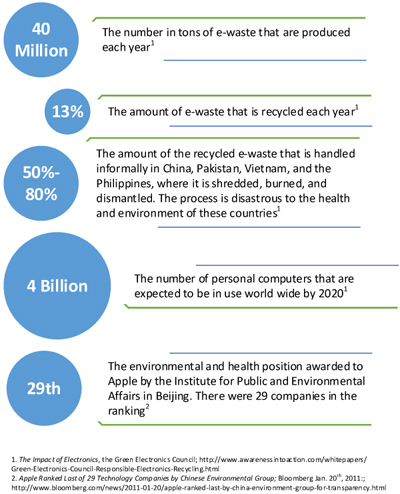
If there is a company more relentless than Apple in over-hyping new product releases, I have yet to hear about it. During the recent release of the latest iPad, a device hardly as functional as a laptop at a lower price, advertisements of “20 Percent Thinner” and “.4 pounds lighter” were proudly trumpeted. Each iteration of the iPhone spawns long lines of devotees for an increasingly marginal gain in features. Nexus, Samsung, Asus and Sony are a few of the other many brands competing neck and neck to shave off a few millimeters or add a few minutes of battery life. These corporations are the public-facing end of a very long and dirty supply chain.
Although luxury consumer electronics are an easy target, the same line of thinking applies to the majority of what will make its way from distant mines and forests, through an obscure foreign manufacturing process, across the ocean and along a dizzying web of truck transportation before taking a pit stop as a shiny lump under a tree, likely of the same origin. I say pit stop because the well-lit nest under the tree is hardly the final destination. No, that shiny bundle will probably end up back in its country of origin in a scrap pile, to be burned after a thorough picking over for rare earth metals by the children of the poor. All of this is for a religious holiday that would most certainly prove unrecognizable to the founder of the religion, and that many Americans face with dread, according to polls.
Is there a way out? A start might be to embrace different values than those with a marketing budget this season and give intentionally.
There are numbers that I find much more compelling than “20 Percent Thinner.” The graphic below highlights a few that might make a more riveting headline. Guilt, perhaps a close second after price, is a useful motivator when looking at these numbers. Rather than diving deeper into the topic of ecocide by popular demand, there is a more convincing and immediately gratifying angle: there is a good chance that the recipient has no interest in the gift you give. Economist Joel Waldfogel in his book Scroogenomics estimates that around $12 billion is wasted each year on unwanted Christmas gifts. The main idea is that if you have $50 to spend, you know much better what you would want with it than a friend or co-worker. As an alternative to the “orgy of wealth destruction,” Waldfogel suggests gift certificates or donations to charity on behalf of the recipient.
A 2007 article by Bill McKibben got right to the point by identifying that in a culture of immense material excess, the best gifts can never be material. Instead, consider gifts of time. These can take the form of services, such as a visit by a landscaper or a window washer. A wonderful option, which may be best given as a group, might be a share in a local CSA (Community Supported Agriculture). Every time that the recipient goes to pick up local, healthy food, they will think fondly of loved ones. Avalon Acre Farms is one in the Murfreesboro area. You can find a listing of their weekly pickup locations by searching for your zip code at localharvest.org. Both half and full share options are available and come to a weekly cost of $20-$55, depending on the options you choose. Happy Harvest and Sinking Creek also offer CSA programs. There is also an ever-increasing number of products from Middle Tennessee showing up at local stores, the patronage of which does much more to support the local economy than any of the warehouse type stores that continue to invade the ‘Boro.
There is one point that I want to be clear on: technology has a place. Tackling health, energy and climate issues on a global scale would be unthinkable without it. But it is strangely out of place under the Christmas tree, as its very existence tends to co-opt the holiday. Somehow a product produced by someone paid a fair wage and that doesn’t take so much from our shared planet seems much more in line with the spirit of the season. Finding the right way to embrace a different vision of Christmas will take creativity as well as a good deal of patience. But once free from the gospel of consumption, you’ll never look back.













